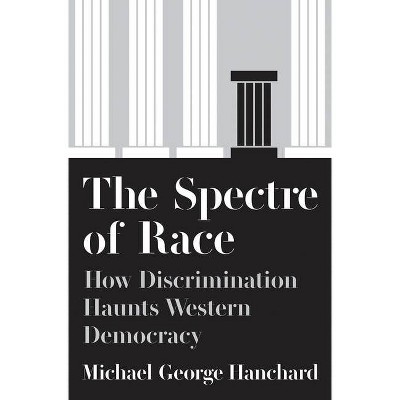The Spectre of Race - by Michael G Hanchard (Paperback)

Similar Products
Products of same category from the store
AllProduct info
<p/><br></br><p><b> Book Synopsis </b></p></br></br><p><b>How racism and discrimination have been central to democracies from the classical period to today</b> <p/>As right-wing nationalism and authoritarian populism gain momentum across the world, liberals, and even some conservatives, worry that democratic principles are under threat. In <i>The Spectre of Race</i>, Michael Hanchard argues that the current rise in xenophobia and racist rhetoric is nothing new and that exclusionary policies have always been central to democratic practices since their beginnings in classical times. Contending that democracy has never been for all people, Hanchard discusses how marginalization is reinforced in modern politics, and why these contradictions need to be fully examined if the dynamics of democracy are to be truly understood. <p/>Hanchard identifies continuities of discriminatory citizenship from classical Athens to the present and looks at how democratic institutions have promoted undemocratic ideas and practices. The longest-standing modern democracies --France, Britain, and the United States--profited from slave labor, empire, and colonialism, much like their Athenian predecessor. Hanchard follows these patterns through the Enlightenment and to the states and political thinkers of the late nineteenth and early twentieth centuries, and he examines how early political scientists, including Woodrow Wilson and his contemporaries, devised what Hanchard has characterized as racial regimes to maintain the political and economic privileges of dominant groups at the expense of subordinated ones. Exploring how democracies reconcile political inequality and equality, Hanchard debates the thorny question of the conditions under which democracies have created and maintained barriers to political membership. <p/>Showing the ways that race, gender, nationality, and other criteria have determined a person's status in political life, <i>The Spectre ofRace</i> offers important historical context for how democracy generates political difference and inequality.</p><p/><br></br><p><b> From the Back Cover </b></p></br></br><p> "The literature on democracy is full of works that analyze how dominated groups struggle to end their marginalization and achieve full citizenship. Hanchard focuses our attention on the other side of that story. Through the lens of race, he brilliantly traces how dominant groups construct democracies more to administer and manage political inequality than to overcome it. Important and timely, this book is informed, elegant, and large in scope and impact."<b>--Jeffrey A. Winters, Northwestern University</b></p><p> "In this wide-ranging and brilliant book, Hanchard sheds light on the tension between democracy and the inequality needed to sustain it. Along the way, he examines the ways in which race has been used and misused through its absence and presence in comparative politics. <i>The Spectre of Race</i> asks big, important questions."<b>--Christopher Sebastian Parker, University of Washington</b></p><p/><br></br><p><b> Review Quotes </b></p></br></br><br>[Hanchard] widens the lens both chronologically (beginning with ancient Greece) and thematically (seeing racism as a subset of discrimination). Hanchard promises to get to the bottom of a paradox of modern democracies, in which the ideology of equality goes head to head with politically dominant groups that have always tried to exclude others.<b>---David S. Katz, <i>Times Higher Education</i></b><br><br>A detailed discussion of the concept of race and its evolution, and how it underpins the debate on citizenship and democracy.<b>---Dr Gennaro Errichiello, <i>Rest Journal</i></b><br><br>One of Times Higher Education's Best Books of 2018<br><br>Winner of the Ralph J. Bunche Award, American Political Science Association<br><br>Lucidly written.-- "Publishers Weekly"<br><p/><br></br><p><b> About the Author </b></p></br></br><b>Michael G. Hanchard</b> is a professor in the Department of Africana Studies at the University of Pennsylvania. His books include <i>Party/Politics</i> and <i>Orpheus and Power</i>.
Price History
Cheapest price in the interval: 22.99 on October 23, 2021
Most expensive price in the interval: 22.99 on November 8, 2021
Price Archive shows prices from various stores, lets you see history and find the cheapest. There is no actual sale on the website. For all support, inquiry and suggestion messagescommunication@pricearchive.us




















